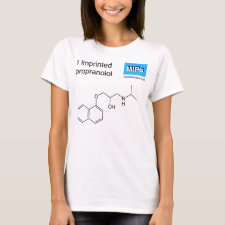
Authors: Chaudhary S, Kamra T, Uddin KMA, Snezhkova O, Jayawardena HSN, Yan MD, Montelius L, Schnadt J, Ye L
Article Title: Controlled short-linkage assembly of functional nano-objects.
Publication date: 2014
Journal: Applied Surface Science
Volume: 300
Page numbers: 22-28.
DOI: 10.1016/j.apsusc.2014.01.174
Alternative URL: http://www.sciencedirect.com/science/article/pii/S0169433214002402
Abstract: In this work, we report a method that allows the deterministic, photo-controlled covalent assembly of nanoparticles directly on surface. As a model system, we study the conjugation of molecularly imprinted polymer (MIP) nanoparticles on a glass surface and confirm that the immobilized nanoparticles maintain their molecular recognition functionality. The glass slide was first modified with perfluorophenylazide and then used to bind MIP nanoparticles under UV irradiation. After each step the surface was analyzed by water contact angle measurement, fluorescence microscopy, scanning electron microscopy, and/or synchrotron-based X-ray photoelectron spectroscopy. The MIP nanoparticles immobilized on the glass surface remained stable and maintained specific binding for the template molecule, propranolol. The method developed in this work allows MIP nanoparticles to be directly coupled to a flat surface, offering a straightforward means to construct robust chemical sensors. Using the reported photo conjugation method, it is possible to generate patterned assembly of nanoparticles using a photomask. Since perfluorophenylazide-based photochemistry works with all kinds of organic material, the method developed in this work is expected to enable immobilization of not only MIPs but also other kinds of organic and inorganic-organic core-shell particles for various applications involving photon or electron transfer
Template and target information: propranolol
Author keywords: molecular imprinting, nanoparticles, Photocoupling, X-ray photoelectron spectroscopy, immobilization



Join the Society for Molecular Imprinting

New items RSS feed
Sign-up for e-mail updates:
Choose between receiving an occasional newsletter or more frequent e-mail alerts.
Click here to go to the sign-up page.
Is your name elemental or peptidic? Enter your name and find out by clicking either of the buttons below!
Other products you may like:
 MIPdatabase
MIPdatabase









